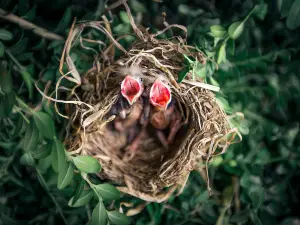
Baby birds, like all other animals, do not have the option to talk and use words as a means to communicate with members of their species or with humans. Because of this, they make sounds and do actions to try to communicate what they’re saying or feeling. Birds of the same species are able to interpret what a bird is communicating quite well and react accordingly. If you’re taking care of a baby bird you may be confused as to why the baby bird is opening its mouth. This article explores the question of ‘why do baby birds open their mouths’
Baby birds open their mouths at you, or their parents, to communicate. They also open their mouths to regulate their body temperature, adjust their crops and thus the food in their crop, because they are ill, or to ask for food.
Table of Contents
Why do baby birds open their mouths?
Thermoregulation: If a baby bird seems to be opening its mouth, as though it is yawning, you can assume that the bird is doing this to thermoregulate. Unlike humans, animals yawn not because they are tired but because they are regulating their body temperature
Adjusting the crop: Birds have a sack in their throat called a crop. This sack is where food is kept before it travels to the bird’s stomach to be digested. A baby bird may open its mouth to adjust its crop and to sit more comfortably. This in turn allows food in the crop to sit more comfortably.
Illness: Sickness in birds can be expessed in many ways. A baby bird can appear very calm while opening its mouth, this can be a sign that the bird is ill, birds will not move too much when sick, this is a survival response to avoid attracting predators. The bird may also have its mouth open while panting or vomiting, these are signs that the bird is sick to a point where it can’t control itself.
Gaping: If a baby bird is opening its mouth towards its parent, or its caretaker, the bird may be gaping. Gaping is a birds way of telling its parent ‘feed me’ many birds do this even after fledging. At this point, the baby may seem like an older or an adult bird but in reality, the bird may still only be a baby.
Bird sitting still with mouth open, what to do:
If the bird is gaping offer it some food, the bird will stop gaping after it has eaten its fill. Once the bird’s crop is adjusted, or it has successfully thermoregulated itself, it will close its mouth. If the bird is ill you may have to take measures to nurse it back to health or get it to a vet that can nurse it back to health.
Getting the bird to a vet can be a mission in itself. To do this, calmly try to catch the bird without risking your or the bird’s safety. The best way to secure a bird, once caught, is to hold its wings against its body. Once secured, you can take the bird to your local vet or to a wildlife rehabilitation centre to get adequate treatment and care. Placing the bird in a cardboard box with a towel inside will keep the bird calm long enough to get to the vet or wildlife rehabilitation centre
Conclusion
In conclusion, if a baby bird is opening its mouth the reason behind this is either: thermoregulation which regulates the temperature of the baby bird, a way to adjust the position of the crop so food sits in the crop more comfortably, a sign of illness, or as a way to let parents or guardians know that it is hungry. If the bird is sick then the best course of action to take is to get it to your local vet or a wildlife rehabilitation centre
If you enjoyed this article then you may also be interested in other pigeon related articles. Here are some articles that you may be interested in: Do baby birds eat as soon as they hatch?, Can baby birds eat rice?, Why do baby birds chirp?, Do baby birds carry diseases?

